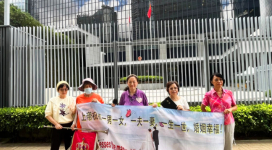PARIS – Global protest against the ban of the Muslim headscarf and other “conspicuous” religious symbols proceeded in Paris in solidarity with London, Lebanon, Jordan, and the West Bank Saturday.
Hundreds and thousands of Muslims from all over France, mostly women in headscarves, took part in the Paris rally.
"We're here for our liberty," said Fatiha Hossol, from the southeastern city of Lyon. "It's our religious obligation to honor our God."
Algerian-born Kawtar Fawzy, 30, from Lyon said, "When I came here, they told me France was the land of human rights. I found out it's the opposite.”
The government is planning to pass the law barring Muslim scarves and other obvious religious symbols from schools to keep them secular and avoid religious strife for the start of the 2004-2005 school year in September. However, many Muslim leaders look at the law as stigmatizing France.
Polls show a clear majority of the French public favour the ban, and the opinion ratings of both Chirac and Prime Minister Jean-Pierre Raffarin went up sharply after the planned law was announced.
However some civil rights groups say it will be seen as targetting a community that already experiences isolation from mainstream society.
The Catholic church has also opposed the law, with Cardinal Jean-Marie Lustiger saying it was encouraging an aggressive anti-religious trend. "This clumsy law risks reopening ... a religious war," he said.
The Saturday march in Paris was called by the Party of French Muslims. Before the rally began, a small group of men prayed at the Place de la Republique.
Dalil Boubakeur, rector of the Mosque of Paris and president of the French council of the Muslim religion, discouraged Muslims from attending, saying the protest would only exacerbate the anti-Muslim climate and create tensions for them in Europe.
He has called for calm among France's Muslims "because we absolutely do not want confrontation." Boubakeur's French Council of the Muslim Faith serves as a link to the government.
In London, several hundred people demonstrated across from the French Embassy in the upscale Knightsbridge area, waving signs and chanting: "If this is democracy, we say: 'No, merci!'"
"The (French) government is isolating Muslims and setting a dangerous precedent," said Ihtisham Hibatullah," spokesman for the Muslim Association of Britain. "Muslims see it as an aggravation."
PARIS – Global protest against the ban of the Muslim headscarf and other “conspicuous” religious symbols proceeded in Paris in solidarity with London, Lebanon, Jordan, and the West Bank Saturday.
Hundreds and thousands of Muslims from all over France, mostly women in headscarves, took part in the Paris rally.
"We're here for our liberty," said Fatiha Hossol, from the southeastern city of Lyon. "It's our religious obligation to honor our God."
Algerian-born Kawtar Fawzy, 30, from Lyon said, "When I came here, they told me France was the land of human rights. I found out it's the opposite.”
The government is planning to pass the law barring Muslim scarves and other obvious religious symbols from schools to keep them secular and avoid religious strife for the start of the 2004-2005 school year in September. However, many Muslim leaders look at the law as stigmatizing France.
Polls show a clear majority of the French public favour the ban, and the opinion ratings of both Chirac and Prime Minister Jean-Pierre Raffarin went up sharply after the planned law was announced.
However some civil rights groups say it will be seen as targetting a community that already experiences isolation from mainstream society.
The Catholic church has also opposed the law, with Cardinal Jean-Marie Lustiger saying it was encouraging an aggressive anti-religious trend. "This clumsy law risks reopening ... a religious war," he said.
The Saturday march in Paris was called by the Party of French Muslims. Before the rally began, a small group of men prayed at the Place de la Republique.
Dalil Boubakeur, rector of the Mosque of Paris and president of the French council of the Muslim religion, discouraged Muslims from attending, saying the protest would only exacerbate the anti-Muslim climate and create tensions for them in Europe.
He has called for calm among France's Muslims "because we absolutely do not want confrontation." Boubakeur's French Council of the Muslim Faith serves as a link to the government.
In London, several hundred people demonstrated across from the French Embassy in the upscale Knightsbridge area, waving signs and chanting: "If this is democracy, we say: 'No, merci!'"
"The (French) government is isolating Muslims and setting a dangerous precedent," said Ihtisham Hibatullah," spokesman for the Muslim Association of Britain. "Muslims see it as an aggravation."
Foreign Office Minister Mike O'Brien said the British government supported the right of all people to display religious symbols.
"Whilst it is for individual countries to decide, in Britain we are comfortable with the expression of religion, seen in the searing of the hijab, crucifixes or the kippa," O'Brien said in a statement. "Integration does not require assimilation."
In Lebanon, some 1,000 Sunni Muslim teenage girls wearing the headscarf demonstrated outside the French embassy. The protest was called by Jamaa Islamiya, a group linked to the Muslim Brotherhood. The teenagers shouted slogans outside the embassy with 200 soldiers and police deployed around the building.
In Amman, some 100 Jordanian women, led by Islamist member of parliament Hayat al-Massimi, staged a sit-in in front of the French embassy in the suburbs of the Jordanian capital. They were holding banners saying “Hijab respects the rights of women and their freedom", and "Hijab is our identity" in English and "Hijab is a divine obligation and not a religious symbol" in French.
"The French decision is in tune with an American anti-Islam campaign as well as Zionist calls against Muslims that consider the hijab a symbol of terrorism", said Massimi.
"We call on France not to stand in the way of Muslim women and their practices," she said.
She also criticised statements made by the Cairo-based Azhar imam, Sheikh Mohammed Tantawi, the highest authority for Sunni Muslims, who affirmed France's "right" to implement the ban.
Some 400 people, 300 of them women, also demonstrated in the Palestinian West Bank city of Nablus, in a protest called by the radical Islamic group Hamas.
Other protests were expected in the United States and Canada in what would be the biggest coordinated demonstration against a law that would also ban Jewish skullcaps and large Christian crosses in French public schools.






![[Exclusive] Escaping Extreme Poverty: The True Story of a Ugandan Girl’s Transformed Life](https://www.gospelherald.com/media/cache/thumbnail/7/23/72324sp_273w_150h_1x_1y.jpg)
